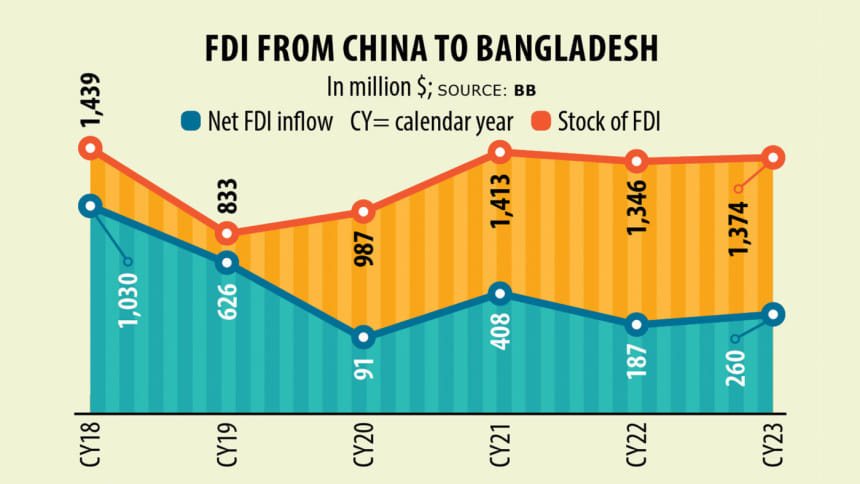Will there be any uptick in investment after PM’s China visit?

There was an expectation that investment inflows from China to Bangladesh would increase substantially following the Covid-19 pandemic as investors in China were looking for an alternative manufacturing hub.
But that has not happened in reality. Instead, over the past six years, investment inflow from China has witnessed ups and downs but has remained far from the heights it had hit in the past.
Around $1.03 billion was invested in Bangladesh from Chinese sources in FY18 and $626 million in FY19. But the inflow fell to just $91 million in FY20 during the height of the pandemic. There were signs of recovery afterwards as $408 million arrived from China in FY21, but that number declined to $187 million in FY22 and $260 million in FY23.
The Chinese Economic and Industrial Zone (CEIZ) in Chattogram has often been highlighted as one avenue for boosting Chinese investment in Bangladesh. But construction of the project is yet to start despite eight years having passed since the Bangladesh Economic Zones Authority (Beza) first took the initiative.
Furthermore, a joint feasibility study to sign a free trade agreement (FTA) between Bangladesh and China has already been conducted. But the date for the beginning of formal negotiations remains unclear.
Against such a bleak backdrop, Bangladeshi businessmen were optimistic that Prime Minister Sheikh Hasina's recent visit to Beijing would provide the necessary impetus for the expansion of bilateral trade and increased foreign direct investment (FDI) from China.
During the visit, Bangladeshi and Chinese companies signed 16 memoranda of understanding (MoUs) to boost investment in Bangladesh. Under four of those MoUs, Bangladesh is set to receive $490 million.
The Chinese companies are expected to invest in Bangladesh's textile, electric vehicle, solar power, fintech and technology sectors.
Nihad Kabir, a former president of the Metropolitan Chamber of Commerce and Industry, said that alongside Chinese investors, the Asian Infrastructure Investment Bank had also shown an interest in investing heavily for big infrastructure projects in Bangladesh.
If the investments materialise as per the investment proposals and MoUs, it will bring a substantial amount of FDI from China, she said.
Although Kabir said that it would take time for the investments to materialise, she also highlighted the importance of the MoUs.
Ashraf Ahmed, president of the Dhaka Chamber of Commerce and Industry, said the visit occurred at a crucial time and is expected to open new areas of cooperation for trade and investment.
According to him, private sector trade and investment flows between the two countries are significantly larger than government-to-government transactions.
The visit focused largely on promoting cooperation between the two countries' private sector, he said, adding that widening trade in that area was very important for economic growth.
As of now, Bangladesh is operating on a large trade deficit with China. But exports to China have to be enhanced eventually to balance that, he said.
To that end, Ahmed said Bangladesh needs to position itself for growing markets in China, especially in areas where it has a competitive advantage.
Al Mamun Mridha, secretary general of the Bangladesh China Chamber of Commerce and Industry, said Chinese investors are keen to invest in different sectors.
He added that a high-powered business delegation would visit Bangladesh immediately to explore the country's business potential.
He added that around 1,000 Chinese investors and academicians took part in a trade and business summit during the Prime Minister's visit to Beijing.
Siddiqur Rahman, a former president of the Bangladesh Garment Manufacturers and Exporters Association, opined that Bangladesh would benefit from Chinese investment whether it is under a joint venture or not.
Additionally, Chinese businessmen will also benefit as their products will enter the US market for a lower duty than that levied on goods made in China, he said.
However, he ruled out a reduction in the trade gap between the two countries as Bangladesh is dependent on China for raw materials but China possesses everything from raw materials to technology and capital.
In a post made on the social media platform X, formerly known as Twitter, Salman F Rahman, the private industry and investment adviser to Bangladesh's prime minister, said Chinese President Xi Jinping has assured Bangladesh of several types of economic assistance, including interest-free loans.
Bangladesh and China will celebrate 50 years of diplomatic relations in 2025. On this occasion, China is keen to work on several projects to strengthen bilateral relations, he said.
Rahman added that China has promised to increase imports of jute and leather products, pharmaceuticals, mangoes and other fruits, and ceramics from Bangladesh and pledged to provide training in various trade, technical, agricultural and manufacturing sectors while also increasing scholarships for students.
Bangladesh exported goods worth $677 million to China while imported goods worth $22.90 billion from the nation in FY23, according to commerce ministry data.


 For all latest news, follow The Daily Star's Google News channel.
For all latest news, follow The Daily Star's Google News channel. 







Comments